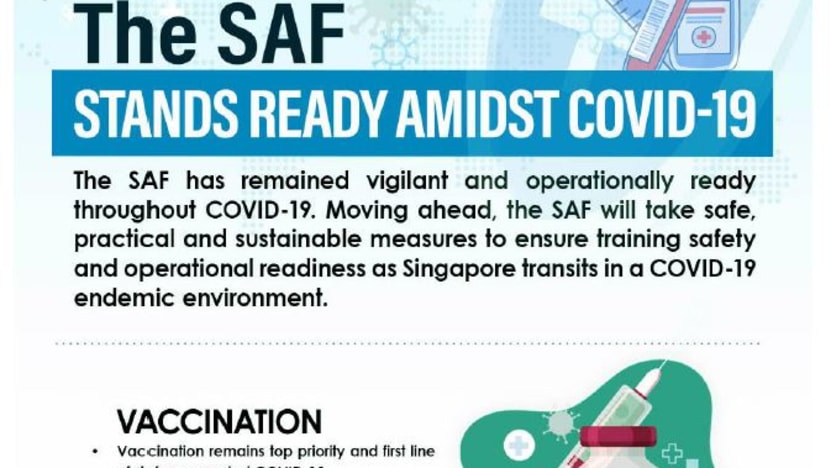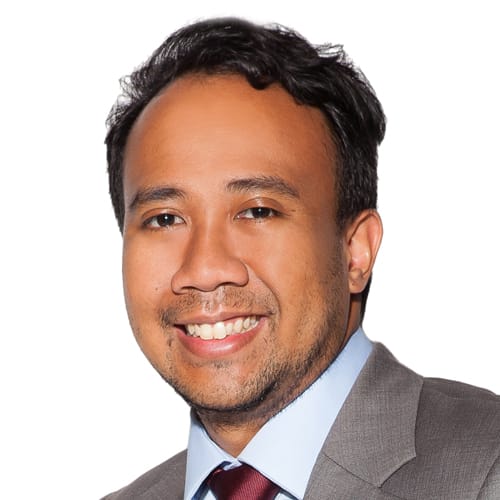SAF has achieved ‘herd immunity’ through COVID-19 vaccinations; IPPT, in-camp training resume: Ng Eng Hen
SINGAPORE: The Ministry of Defence (MINDEF) and the Singapore Armed Forces (SAF) have achieved “herd immunity” against COVID-19, with more than 90 per cent of personnel having received their first dose of the vaccine.
“In a week or so, more than 90 per cent would have received their second dose. That is quite satisfactory, it means that the SAF has achieved herd immunity,” Defence Minister Ng Eng Hen told reporters on Monday (Jun 28) ahead of SAF Day on Thursday.
MINDEF said in a separate factsheet that 92 per cent will be fully vaccinated by the second week of July.
“But we are still trying to push it to try to hit 95 per cent, which is a very high vaccination rate, and even up to (achieving) full vaccinations,” said Dr Ng.
READ: COVID-19 vaccinations begin for Singapore Armed Forces personnel
READ: Vaccinations, swab tests for SAF recruits entering basic training as part of COVID-19 measures
This comes as the SAF prepares to live with an endemic COVID-19 and further reduce disruptions to National Service activities even if a soldier tests positive.
In an endemic situation, safety measures taken would be “much less” than in an epidemic, Dr Ng noted.
“So even if infections arise in our soldiers going forward, we will not need to close the training schools like Basic Military Training Centre (BMTC), Officer Cadet School or Specialist Cadet School,” he added.
READ: SAF will ‘comprehensively relook’ how it operates, trains and works amid COVID-19 pandemic
In the interview to mark SAF Day on Thursday, Dr Ng highlighted that the number of COVID-19 cases in the SAF remains “very low”, with the majority getting infected outside the SAF.
The virus has not spread internally among second-degree contacts to form large clusters in the SAF, Dr Ng said.
“We have been able to detect cases early and with the various measures, we have not had to shut down because of cases detected, even from infections outside,” he added.
“And apart from the circuit breaker when we pre-emptively delayed the BMT, we have not had to disrupt any major training, or any training in fact.”
FEWER DISRUPTIONS EXPECTED
With more personnel being vaccinated, Dr Ng expects fewer disruptions to activities like in-camp training (ICT) and the individual physical proficiency test (IPPT).
More large-scale and overseas exercises can progressively resume as well.
“Because we have reached such high levels of vaccination, restrictions can be eased to allow units to operate at maximum effectiveness, even for training and exercises, and for in-camp training where the majority of personnel are vaccinated,” Dr Ng explained.
ICT and NS fitness activities, including IPPT and the NS Fitness Improvement Training, have resumed from Monday, Dr Ng said.
The SAF had on May 18 deferred non-essential ICT and IPPT amid a spike in COVID-19 community cases.
READ: Singapore Army completes transformation to a 3rd generation force, on track for next-gen shift
Moving on to overseas exercises, Dr Ng confirmed that the Republic of Singapore Air Force and the Army will conduct Exercise Forging Sabre, an integrated live-firing exercise, in the US in September.
As for Exercise Wallaby in Australia, SAF’s largest overseas training exercise, Dr Ng said Singapore has to wait for the green light from authorities there.
“As you know in Australia, various cities are in lockdown, so I do not see us exercising there soon in full capacity,” he said. “Maybe not this year, but the moment they say yes to us, we are ready to exercise.”
Other overseas exercises “on the cards” include Exercise Cooperation and Exercise Maritime Cooperation with China’s People’s Liberation Army and People’s Liberation Army-Navy, Dr Ng said.
READ: ‘Smart’ RSAF airbases to use drones to detect intruders, more efficient munitions loader will be deployed
VACCINATION, TESTING AND COHORTING
In an environment where COVID-19 is endemic, the SAF will move forward with a “three-pronged strategy” of vaccination, improved testing and surveillance, as well as cohorting, said MINDEF.
Routine testing is already being done for SAF frontline personnel, BMT trainers and operationally ready national servicemen returning for ICT. The SAF is also looking at faster and less invasive methods like deep-throat saliva rapid tests.
Soldiers will also continue to cohort - or train in smaller, separate groups - without intermingling. This removes the need to shut down entire units when COVID-19 cases emerge.
“If nationally, the vaccination rates go up and we move towards the kind of situation that we dealt with H1N1, then you can reduce some of that cohorting as well,” Dr Ng said.

H1N1 has infected hundreds of thousands of people in Singapore with 18 deaths since the first case was reported in 2009, meaning it could be more infectious but less severe than COVID-19, Dr Ng said.
“So the main point for me bringing up this comparison to H1N1 is that when the disease does not cause morbidity and mortality, serious illness and deaths, you just live with it,” he added.
“We stopped contact tracing for H1N1. We did not chase the number of cases anymore. That is exactly what we did with H1N1. At this point, as more and more people get vaccinated for COVID-19, it brings us to the H1N1 situation.”
READ: COVID-19 threat could erode with time just as with H1N1, say experts
Still, Dr Ng acknowledged that the emergence of a more lethal and infectious coronavirus variant will be a concern, calling the situation an “entirely new ballgame”.
“It will be a miserable few years trying to deal with it because it will mean that we have to wait for a new vaccine, a better vaccine,” he said.
“That is not something we want to contemplate but if it happens, we have to deal with it.”
BOOKMARK THIS: Our comprehensive coverage of COVID-19 and its developments
Download our app or subscribe to our Telegram channel for the latest updates on the coronavirus outbreak: https://cna.asia/telegram












